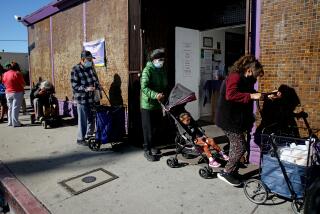Program Steps Between Hardship and Homelessness
- Share via
The way the city of Oceanside sees it, an awful lot of its citizens are just barely making ends meet, perpetually one paycheck away from homelessness.
So officials have come up with an unusual program to head off the problems of being homeless by helping those who aren’t yet on the street.
The plan is to hand out one-time cash grants to people who are in immediate danger of being evicted, according to city housing director Dick Goodman. Applicants can receive up to $600 and are not obligated to repay the money, he said.
Families and individuals can qualify by demonstrating that their problem is due to a sudden loss of income and that the prospect of having a stable income in the future is good, Goodman said. “If they can prove it’s just a temporary crisis, we can come in and help them get over that one month,” he said.
Preventing Homelessness
“Once you’re out on the streets, it can take up to six months to get money together for rent deposits, utility hookups and so on,” Goodman said. “The real idea of the program is to prevent them from becoming homeless in the first place.”
Ideally, the city would like the applicants to pay half the amount they need to stay afloat, but, if they can’t afford it, their contribution can be reduced to $50, Goodman said.
The program, one of the first proposals of the city’s Homeless Task Force, which was organized in December, is expected to be in effect by Aug. 1.
The money for the program will come in part from $75,000 in federal funds allocated to San Diego County for housing. Oceanside received $10,000 of that money--the maximum grant available to small cities--and the City Council voted to add $10,000 in matching funds.
The prevention program is patterned after a 7-year-old federal rent subsidy program administered by the Federal Emergency Management Agency, which aids about 400 Oceanside families.
The programs differ in that the Oceanside money will be used only for people who have housing, not those already on the street, in shelters or relocating.
Although the city technically has less money to hand out than FEMA, there is a strong motivation for families in financial trouble to turn to Oceanside instead: “There isn’t any FEMA money right now,” said Mary Lou Sauerborn, director of the Ecumenical Service Center of Oceanside. “We get our FEMA allocation once a year, and it generally lasts only three months.”
The Ecumenical Center, a nonprofit organization dedicated to meeting people’s emergency needs, oversees the FEMA program in Oceanside and will run the city program as well.
“In doing this kind of assistance, we use a case management approach--kind of a holistic approach,” Sauerborn said. “We try to work with the entire family and their problems.”
“We will work with them on budgeting and other things that would be helpful to keep this family solvent once they’re back in the apartment.”
Sauerborn wants potential applicants to know that the program is not for everyone, least of all the “hard-core” homeless with a long history of problems. Applicants will undergo a lengthy screening that will include at least two visits to the Ecumenical Center, documentation of the family’s financial problems and the cooperation of the landlord.
“This is for people who have been paying the rent and doing OK,” Sauerborn said, “but maybe they were laid off of their job, or one parent left the family and the spouse was left with the children to support.”
More to Read
Sign up for Essential California
The most important California stories and recommendations in your inbox every morning.
You may occasionally receive promotional content from the Los Angeles Times.






